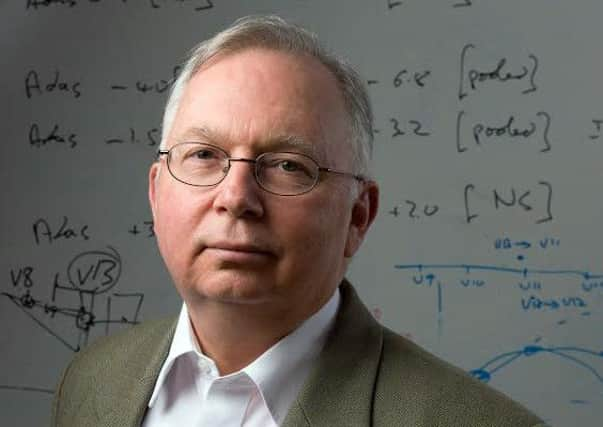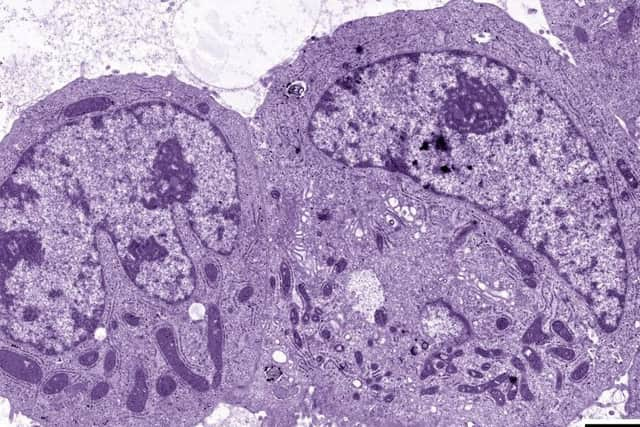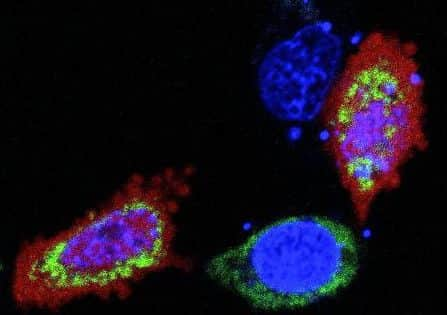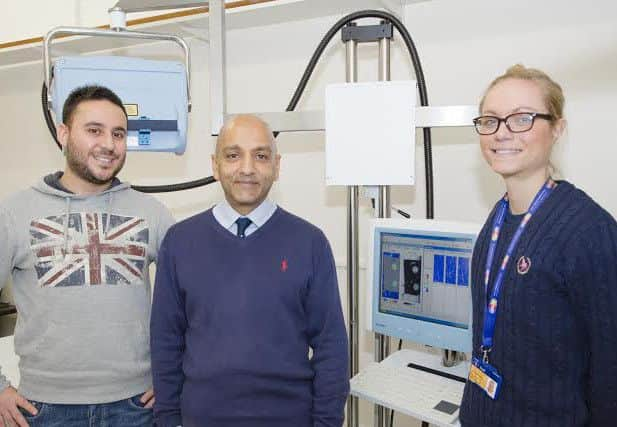Meet Scotland's top scientists fighting world's worst diseases


Here we look at the scientists working in Scotland against some of the country’s most common and dangerous diseases - and the steps they are making towards better treatments and cures.
CANCER


Number of Scots who suffer- around 30,000 diagnoses a year.
The cure hunters: Dr Stephen Tait and Professor Andrew Biankin - Glasgow University/Beatson/Wolfson Wohl Cancer Research Centre
Advertisement
Hide AdAdvertisement
Hide AdDr Tait is developing a technique that gets cancer cells “addicted” to drugs that will kill them within minutes.
The technique, called “mito-priming”, has been hailed as a breakthrough in the fight against the disease.


Dr Tait, 41, was born in Edinburgh and attended Dalkeith High School before studying Medical Microbiology at Edinburgh University. His lab is now based at the Cancer Research UK Beatson Institute in Glasgow.
He developed the mito-priming technique while trying to understand how cancer cells die.
Mito-priming can be applied to identify new anti-cancer drugs in the mould of BH3-mimetics which have been developed to specifically kill tumour cells.
Meanwhile, Professor Andrew Biankin, 50, and his team at the university’s Institute of Cancer Sciences have advanced understanding of pancreatic cancer by classifying four different types of the disease to improve diagnosis and treatment.


Professor Biankin, who is originaly from Sydney, Australia, said there was an urgent need to better understand the pathology of the disease given it can grow silently for 10 to 15 years. Survival is typically measured in months and the cancer has a five year survival rate of less than 5 per cent.
He has been the Regius Professor of Surgery and Director of the Wolfson Wohl Cancer Research Centre at Glasgow University since February 2013.
ALZHEIMER’S DISEASE


Number of Scots who suffer - 90,000
Advertisement
Hide AdAdvertisement
Hide AdThe cure hunters: Professor Claude Wischik and Professor Matteo Zander, Aberdeen University
Professor Wischik was born in France and grew up in Australia, He completed a PhD on Alzheimer’s at Cambridge University in 1980 before arriving Aberdeen in 1997. Since then, he has helped to establish the city as an innovation centre for the treatment of the disease.
In 2002, Wischik co-founded TauRx Therapeutics with the late Dr K M Seng in Singapore to discover new approaches to treatment and the university spin out company has since created LMTX - the first drug to change the course of disease.
It works by targeting “abnormal tangles” of tau protien in the brain cells, a characteristic of the condition.
Last December, the spin out company won £88m in new funding to take international clinical trials to the next level.


Professor Zanda, originally from Italy, has been a Professor of Medical Technologies since 2009. He is leading research in the field after being able to purchase high performance equipment, including liquid chromatography system and a mass spectrometer - both which track changes in the brain - through a private donation. Previously, he had to send samples for testing in Italy
TYPE 1 DIABETES
Number of Scots who suffer - around 30,000
The cure hunters: Professor Terence Wilkin, Dundee University/Exeter University
Scotland has the third highest rate of Type 1 Diabetes in the world and a major new study has been launched in Dundee to determine whether the auto-immune disease can be prevented in high-risk children.
Advertisement
Hide AdAdvertisement
Hide AdProfessor Wilkin will lead a team at Dundee University who will study 6,400 families in Scotland affected by the condition with a view to expand the research across Scotland and the rest of the UK
It has been funded by $1.7m of funding from JDRF, which backs research into Type 1 and supports its sufferers.
Research has, in the past, focussed on Type 1 being caused by a faulty immune system but Professor Wilkin has an “accelerator theory”. This suggests that autoimmunity occurs as a response to damaged beta cells which, when stressed by a modern environment , send out signals that switch on the immune system.
The study will test whether metformin, a common diabetes drug known to protect the beta cells from stress, can stop the immune response that goes on to destroy them.
CARDIOVASCULAR DISEASE
Number of Scots who suffer - around 7,200 deaths a year.
The cure hunters: Dr Faisel Khan, Dundee University
Dr Khan’s research is developing a new treatment for cardiovascular disease by identifying and “switching off” harmful enzymes that can cause inflammation in the blood vessels.
The researchers have identified a group of enzymes called SIK’s that reduce the production of chemicals which protect the blood vessels from inflammation.
Dr Khan, 52, who attended secondary school in west London before completing two degrees at Dundee University, is hoping they can find a way of “switching off” these enzymes so the protective chemicals can do their job.
A two year project is being funded with a £137,206 grant from national charity Heart Research UK.
Advertisement
Hide AdAdvertisement
Hide AdChronic inflammation is central in the development of cardiovascular disease, particularly the build-up of fatty material inside blood vessels.
Dr Khan hopes to reach a better understanding of the mechanisms that lead to persistent inflammation in order to prevent it.
MOTOR NEURONE DISEASE
Number of Scots who suffer - currently 474 people are living with condition.
The cure hunter - Professor Tom Gillingwater, The Euan MacDonald Centre for Motor Neurone Disease in Edinburgh
Professor Gillingwater, who graduated from Edinburgh University with a PhD in neuroscience in 2001, has focussed research on spinal muscular atrophy, the childhood form of MND. He recently led a study which found that a plant pigment called quercetin - found in some fruits, vegetables, herbs and grains - could help to prevent nerve damage associated with the condition.
The team has found that the build-up of a specific molecule inside cells – called beta-catenin – is responsible for some symptoms of SMA. In tests on zebrafish, flies and mice, scientists found that treating the disease with purified quercetin – which targets beta-catenin – led to a significant improvement in the health of nerve and muscle cells.
While quercetin did not prevent all of the symptoms associated with the disorder, it is hoped it could aid treatment in the early stages of the condition.
Better versions of the chemical that are more effective than naturally occurring quercetin are now being created.
